Speaking American’ese 101
Top 10 Common English Lessons That Everybody Messes Up
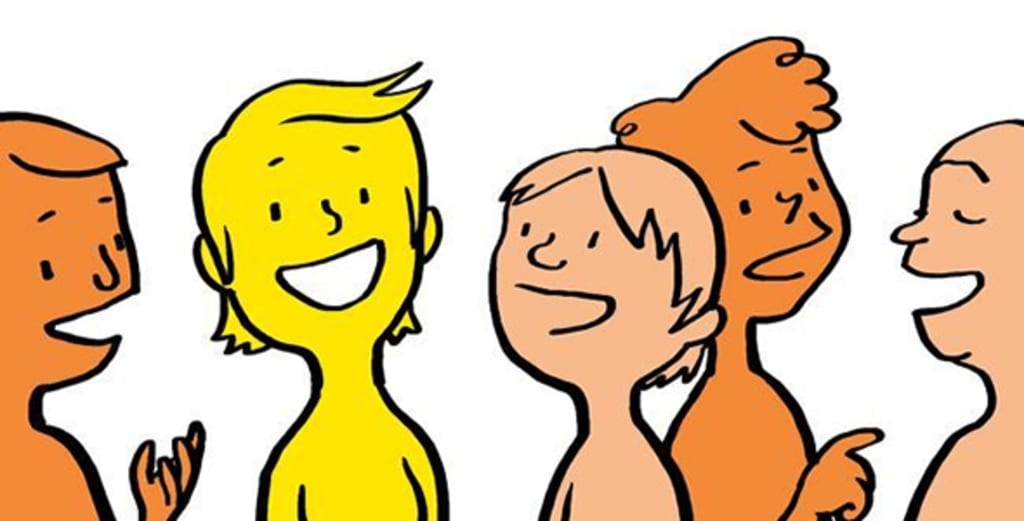
Now, I know this may feel like your high school English class all over again, but let us be real with ourselves for a moment. We all can admit that we do not know how to use these following word/phrases properly. We will stand up and proudly claim to be full-fledged Americans, and yet we barely know how to speak our own language. Do not worry! Here is a little pick-me-up emergency tip guide to keep handy in your back pocket. I know some of the titles may be a little tacky, so just please bear with me and enjoy a quick laugh.
Number 1: "Remember the phrase: 'Lay it on me.'"
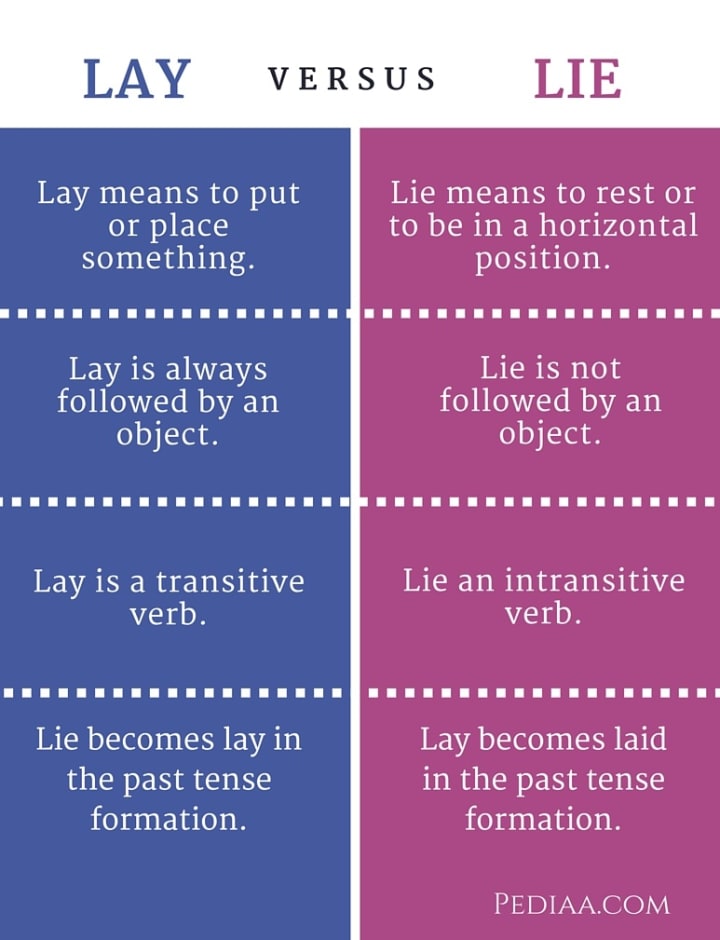
LAY
“Lay” needs a Direct Object (“D.O.”). The word “lay” has to be doing something (an action) to an object or person in order for the sentence to be correct.
Example:You lay the baby down on the bed. Here, “baby” is the D.O. because it is showing what you did to someone else.
LIE
“Lie” does not need a Direct Object in order to work.
Example: You lie down in the grass. There is no D.O. in this sentence because it is stating what you did to yourself.
Number 2: 'Believe to receive the weight of the sleigh. What a relief…Weird, no?'

This is a famous one: “i before e.” We all remember the timeless elementary rhyme: “i before e, except after c …”. But, what majority of Americans do not realize is that ever-important ending: “… or when sounding like "A" as in neighbor and weigh.” This can be a tricky one, especially if you are not a strong grammarian.
Example "i before e": Even though this little pick-me-up is incorrect, it is still a good reference tool when trying to spell difficult-sounding words such as, "tier", "yield", "shriek", and many more. As long as you do not see a "c", then normally you can safely apply this rule.
Example "except after c":Here is the tricky part. When spelling a word, and a "c" comes next, generally you can put the "e before the i" and it will make sense as long as it still makes the "c-sound [see-sound]": receive, conceive, ceiling, and others.
Exceptions "or when sounding like "A" etc.:
The English language is very inconsistent, and this is why we struggle with it so much. Below is an excerpt from the Merriam-Webster website describing all of the other “exceptions” to this iconic little rhyme …
“I before e, except after cOr when sounded as 'a' as in 'neighbor' and 'weigh'Unless the 'c' is part of a 'sh' sound as in 'glacier'Or it appears in comparatives and superlatives like 'fancier'And also except when the vowels are sounded as 'e' as in 'seize'Or 'i' as in 'height'Or also in '-ing' inflections ending in '-e' as in 'cueing'Or in compound words as in 'albeit'Or occasionally in technical words with strong etymological links to their parent languages as in 'cuneiform'Or in other numerous and random exceptions such as 'science', 'forfeit', and 'weird'.”
(Credit for this jingle goes to Merriam-Webster.)
Number 3: 'What are the effects of trying to learn this Rule and how will it affect me?'

The website Vocabulary.com describes it best with: "choosing between affect and effect can be scary. Think of Edgar Allen Poe and his RAVEN: Remember Affect Verb Effect Noun. You can't affect the creepy poem by reading it, but you can enjoy the effect of a talking bird."
These two words trip up people the most. One is a noun and the other is a verb, but finding out which one is which is not just a process of elimination.
AFFECT
"Affect" is usually useful as a verb. We can define it simply as “to have an impact on [something/someone]."
Example:The falling raining pouring down on us will affect our hiking trip. The words "will affect" is a verb phrase telling us what the rain is having an impact on: our hiking trip.
When people normally talk, the word "affect" is always a verb from habit. That means that we are basically trying to express that we "are going to influence something".
EFFECT
"Effect" explains "the result(s) of an action" (as in: “cause and effect”).
The word "effect" we generally use as a noun to show "the result(s) or impact(s) of something/someone; the outcome of the situation." If you see a "a/an/the" at the beginning of the sentence or in front of a word then it is usually an effect.
EXCEPTIONS:
As if this were hard enough to grasp, let us throw some more "rules" into the mix. "Effect" can have a use sometimes as a verb to express "to produce or to cause to come into being." Basically, "effect" is trying to instigate something into happening/bringing into existence.
Example: A government unable to effect any change is a government that will produce no surprises.
When you break down the sentence, you can replace "effect" with produce or cause and see if the sentence still makes sense: "a government that can't produce change won't be able to produce surprises.
Number 4: 'What IF we WERE to skip this lesson? As if she were to let US off the hook that easily. Nice try, guys.'
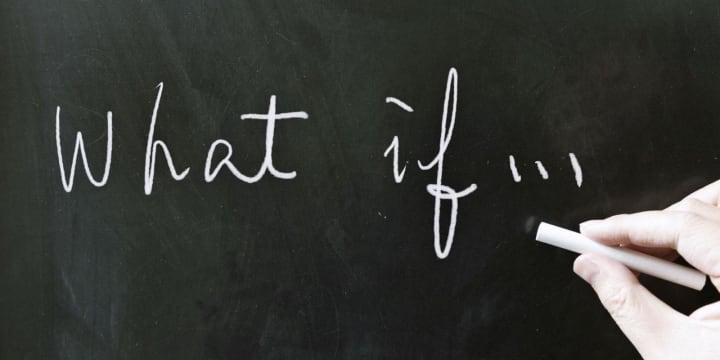
Yes, you did guess it right. This topic is going to be about the two phrases: "what if" and "as if". This is confusing because not too many people know that when they use these two phrases, the verb choice must still be were for the given sentence. That is because they both refer to hypothetical situations. There are two types of "IF" scenarios: "what if" for questions and "as if" for everything else.
WHAT IF
This phrase is generally used for all questions. You begin the sentence with "what if" and the verb or action will be were. It would be similar to you trying to make a prediction about something.
Example: What if it were to rain right now, would it ruin our day?
AS IF
This talks mainly for the rest of the regular statements. We can use the phrase "as if" in place of the word "like" because "like" is followed by a clause. "As if" needs a clause also in order to function properly in a sentence. The same rule applies here also with using the verb were.
Example:1) It looks as if Samantha will become the next district manager. 2) He spends money as if there WERE no tomorrow.
Number 5: 'We cannot go out there anymore because they're now coming with us tonight due to their mother asking us to babysit.'
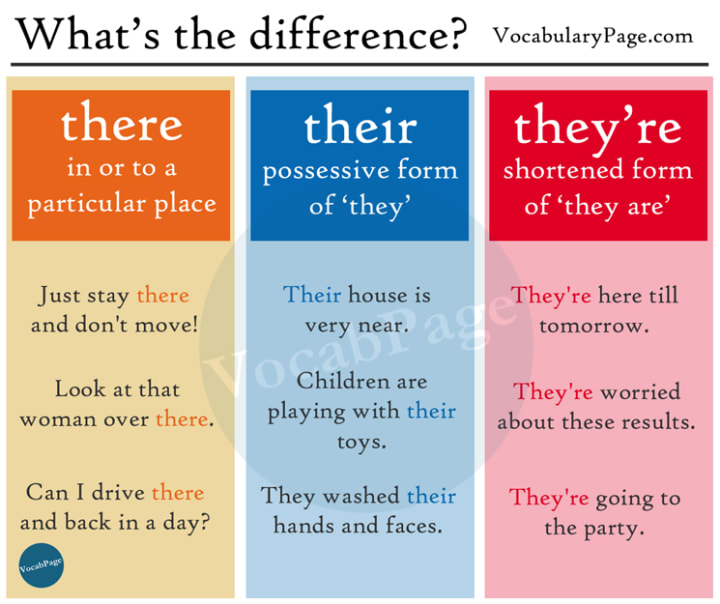
This one is a little bit easier. We are going to talk about the usage of the different conjugations of "they're, there, and their." Their shows possession, there is a direction, and they're is short for "they are."
THEIR:
"Their" is a possessive pronoun. If Christina and Bridgette own a house, then it is "their house". If Bridgette owns the house by herself, then it is solely hers. The word "their" is co-shared by its "e" and "i." Sometimes the word their replaces the use for a singular pronoun "his or her."
Example: Who just blew their horn at me? [you can simply say "he did" or "she did" to answer this question that is directed to a singular audience.]
THERE:
"There" is a direction—there is partnered with "here" and both represent directions. "There" is just the word "here" with a "t" because you have to travel just a little bit farther to get from here to there. "There" can NEVER be the subject of a sentence!
Example:There is Charlie's bike. There directs usto the subject which is "bike."
THEY'RE:
"They're" WILL ALWAYS means "they are." If you can replace "they are" for "they're" in any sentence, and it still makes sense, then you got it correct. The apostrophe stands in for the missing "a" in the phrase.
QUICK RECAP:
Replace there with "here".
Replace their with "our".
Replace they're with "they are".
Number 6: 'You're my sweetheart only if you give me your heart.'
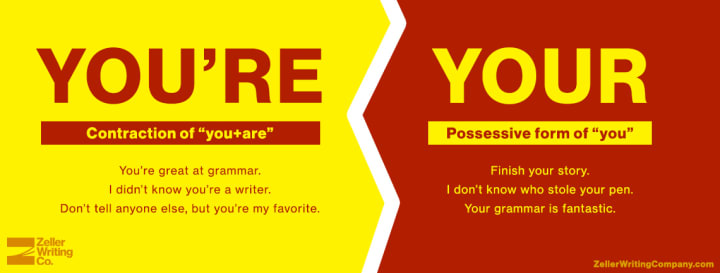
Just like in the previous tip, this one is also going to be a breeze. I am going to break down the two ways to correctly use "you'reand your."
YOU'RE
"You're" is short for "you are" and your shows ownership. You're is just a simple contraction standing for "you are." The apostrophe goes where the "a" has been removed.
Example:You're the most funniest person ever! You're is just the same as saying "You are the most funniest person ever!"
YOUR
"Your" is the possessive form of the second person pronoun, "you." Very different from you're because your used incorrectly will change the whole meaning of the sentence. There is a difference in trying to say You're Dinner and Your Dinner. Without that apostrophe, the word your points or describes something that belongs to the person being spoken to.
Example:I gave the cashier your name so she could finish signing you up for store discounts.
Number 7: 'Who ate my lunch! Whom should I talk to about this issue?'

It is no debate! We must figure out how to choose between "who" and "whom." If you think the whom examples sound awkward, you are not alone. Many people don’t use whom in casual speech or writing. Others use it only in well-established phrases such as “to whom it may concern.” Some people never use it. It’s not unusual at all to hear sentences that mixes up the two words in normal conversation.
WHOM
"Whom" is used to refer to the object of a verb or preposition. If you can replace the word with “him” or “her,” then use whom.
Example:To whom was the letter addressed? In this sentence, you can change it to The letter is addressed to HIM or HER, and check to see if it sounds right.
Example: I do not know with whom I will go to the prom. I do not know if i will go to the prom with HIM or HER. You know how to fix this one.
WHO
If you can replace the word with “he”' or “'she,” use who. "Who" is the subject of a sentence. [You like what I did there, ha ha?]
Example:Who would like to go on vacation with us this year? You can rewrite the sentence as HE or SHE would like to go on vacation with us this year. If it makes sense, the you have used the word correctly.
Number 8: 'I would accept your apology, except for it being not sincere. How rude!'
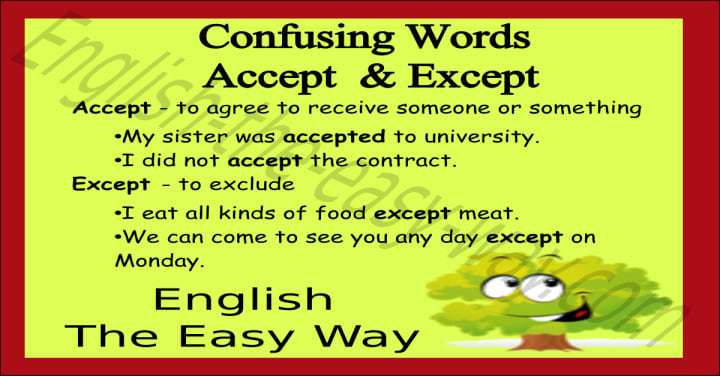
ACCEPT
To "accept" is to receive or believe something or someone. It is the verb form that confuses people. The word "except" is the one usually being switched around when you really mean to use the word "accept." To "accept" is to receive something like tea, an idea, or a student into your college.
Example:The University is willing to accept my reference letter. That means the University is willing to receive my letter.
EXCEPT
"Except" is to exclude everything and everybody. "Except" usually means "unless" or "excluding," but can sometimes be used as a verb meaning "to leave out."
Example "unless":They cannot visit our house except on the weekends. This version is using the word to mean unless. You can switch them and the sentence will still make sense.
Example "exclude":The meaning of bring in solitary confinement as an inmate is you are being held in complete isolation from everybody except the guards. Here, you are excluding everybody else who are not prison guards.
Example "to leave out":But thickness excepted, he made about the same figure in the street next day (credit to vocabulary.com). This sentence is talking about the artist is leaving out the thickness in his figure.
HINT:
Accept something by giving it an A.
Exclude it with an X.
Number 9: 'Who's driving us to the baseball game? Let us draw straws to find out whose turn it will be.'
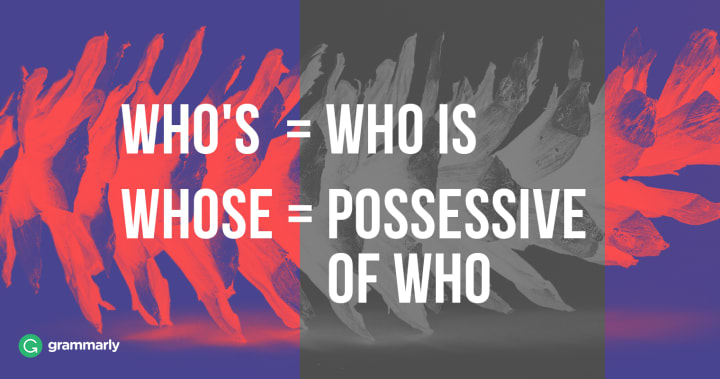
Both "who’s" and "whose" come from the pronoun who. These two words are homophones, meaning that they sound the same, but have different definitions.
WHO'S
"Who’s" is a contraction of the two words who is or who has. The contraction is made with an apostrophe conjoining the "who" to the "s." Think of it this way, the apostrophe is the glue that sticks together the two words. [who ' is] or [who ' has] to equal [who's].
Example "who is":Who's ready for bed? You are asking who is ready.
Example "who has": Who's to run to the grocery store? You are now asking who has to run.
WHOSE
"Whose" is the possessive form of who. "Whose" is a possessive pronoun. That means that it is trying to own something; to show ownership. You use "whose" when you are asking (or telling) what something belongs to somebody (to show it is theirs).
Example "asking": Whose soda is this? You are asking who has the soda. That is showing ownership; therefore, you would use "whose."
Example "telling": Let us find out whose car is parked in my parking spot. In this sentence, you are telling that the car belongs to somebody. It still shows ownership, so once again the word "whose" is correct.
EXCEPTION
"Whose" can also mean “belonging to whom,” and occasionally “of which.”
Number 10: 'What is the capital of Maryland, and does it have a Capitol building there?'
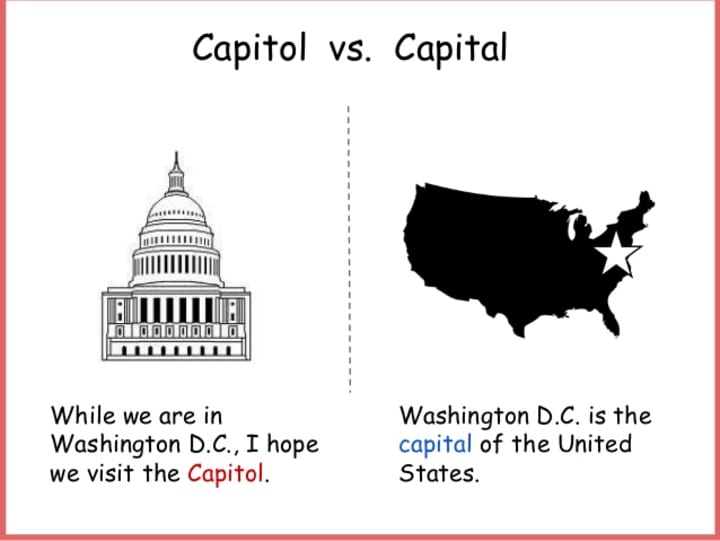
Let us now wrap up this mini-English class with a final quiz. Do not worry, it will be easy like an open-book test. We are going to learn about "capitol" and "capital".
CAPITAL
This is the most important city in an area, region, country, etc. Also, it can refer to the first letter of a word (America, Lucy, The).
Example:The teacher told Caroline that the capital of Maryland is Annapolis.
CAPITOL
This is building where state legislators and other government officials meet and have session.
Example: We are going to take a trip down to Washington D.C. to visit the capitol building.
About the Creator
Robyn Welborne
I am an aspiring creative writer who is currently working for my double Associate’s Degree in English. My writing has no limits and no filter. Anything and everything from all genres; if I think about it, then I will write it down. Enjoy!
Enjoyed the story? Support the Creator.
Subscribe for free to receive all their stories in your feed. You could also pledge your support or give them a one-off tip, letting them know you appreciate their work.






Comments
There are no comments for this story
Be the first to respond and start the conversation.